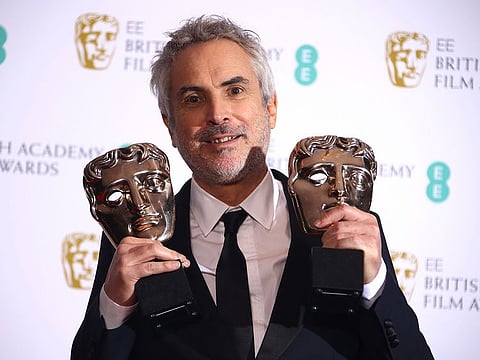Netflix makes Baftas breakthrough with 'Roma'
Alfonso Cuaron film beats 'The Favourite' to best film and best director

London: Netflix black-and-white production “Roma” triumphed at the Bafta film awards on Sunday, boosting Oscar hopes for the US streaming giant despite concerns its business model undermines the film industry.
The cinematic love letter to director Alfonso Cuaron’s childhood in Mexico City in the 1970s edged out black comedy “The Favourite” for best film and best director.
“I’m seriously touched this film has been received the way it’s been received,” Cuaron said at a star-studded ceremony in London’s Royal Albert Hall that was also attended by Prince William and his wife Kate, the Duke and Duchess of Cambridge.
Cuaron thanked Netflix for “having the courage” to get behind “Roma” as he picked up the gong on stage.
The success of the film “in an age where fear and anger are proposed to divide us means the world to me”, he said.
Netflix UK tweeted its congratulations, saying it was a “deeply moving film and deserves all the love it’s getting”.
The film portrays domestic strife and social hierarchy amid political turmoil and focuses on a housekeeper and nanny called Cleo, played by indigenous actress Yalitza Aparicio.
“Roma” dented expectations of a clean sweep by “The Favourite” which picked up best actress for Olivia Colman as Queen Anne and best supporting actress for Rachel Weisz playing her confidante and lover.
The film, about a cantankerous 18th-century British queen and her scheming court, had been nominated for 12 awards and picked up seven on the night.
“She doesn’t take herself too seriously and she enjoys what she’s doing,” Greek director Yorgos Lanthimos said of Colman.
Colman, 45, was up against Glenn Close (“The Wife”) and Lady Gaga (“A Star is Born”) — the same power duo she will face at the Oscars on February 24.
Weisz won out against co-star Emma Stone who was nominated in the same category.
Weisz and Stone are also in the running for Oscars in a proud year for the British film industry.
Red carpet for Netflix?
“Roma” is also nominated for best picture at the Oscars later this month, the first-ever nomination for Netflix which has propelled it into the Hollywood club of elite filmmakers.
While it has progressively been welcomed at most major film festivals, Netflix still finds that Tinseltown’s red carpet is not fully rolled out — with theatres up in arms about its position as a distribution king and A-list content provider.
After the Oscar nominations came out, mega-theatre chains AMC and Regal — by far the top two in the business in America — announced that “Roma” would not be screened in their annual best-picture showcases.
In all, “Roma” was shown in roughly 900 theatres around the world — more than any other Netflix film, but far short of the norm for a usual wide release. Netflix never released any box office data.
While Netflix has made some good-faith efforts to gain Hollywood’s acceptance, it did so while only making minor concessions — and no changes to its business model.
It only waited three weeks after the release of “Roma” in theatres to put it up on its platform, far less than the 90 days that cinema owners ask studios to hold back.
‘Immense responsibility’
Last year’s ceremony saw Hollywood stars paint the red carpet black in solidarity with the #MeToo movement.
The 2019 edition has also been tinged by scandal.
Bafta removed “Bohemian Rhapsody” director Bryan Singer from the Queen biopic’s citation in the outstanding British film nomination “in light of recent very serious allegations”.
This referred to an article in the US magazine The Atlantic detailing sexual misconduct allegations that included underage sex.
Singer denies the story and the film itself was still up for the award, although it failed to win it.
Rami Malek’s portrayal of the late Queen frontman Freddie Mercury — a victim of the AIDS epidemic in the days when homosexuality was taboo in rock-and-roll — earned him the best actor award, however.
After winning the Bafta, he paid tribute to Mercury as “the greatest outsider of them all”.
Malek won against Christian Bale’s transformation into the humourless but powerful former US vice president Dick Cheney in “Vice”.
Best supporting actor went to Mahershala Ali for “Green Book”, a comedy-drama in which he plays a jazz pianist on a tour of America’s Deep South in 1962.
“Free Solo” — a film about the first person to climb El Capitan in Yosemite National Park without ropes — won the award for best documentary.


